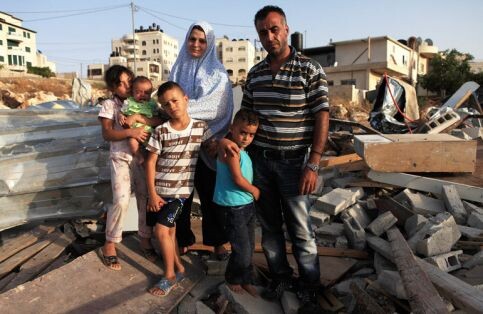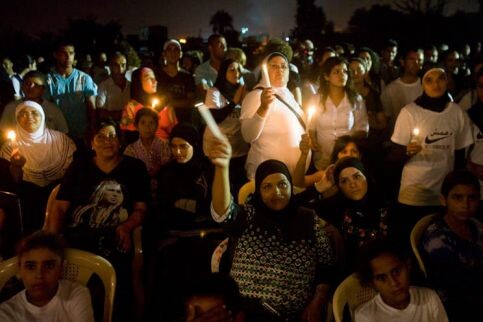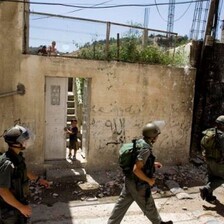The Electronic Intifada 15 July 2010

A Palestinian family stands on top of the rubble of their home in Beit Hanina after it was destroyed by Israeli authorities on 13 July 2010. (Anne Paq/ActiveStills)
The al-Rajabi family of the Beit Hanina neighborhood in occupied East Jerusalem were made homeless on Tuesday, 13 July, after Israeli demolition vehicles razed their home to the ground. Five other homes and structures were destroyed earlier in the day in the Issawiya and Jabal al-Mukabber neighborhoods, also in East Jerusalem.
Speaking to Sherine Tadros of Al-Jazeera English following the demolition, Linda al-Rajabi, mother of five children, said that Israeli police ordered her family to immediately evacuate their home and remove all of their belongings from inside. “They demolished the house without giving a warning or anything,” al-Rajabi told Tadros. “[The Israelis] can build 600 settlements, and I am in a shack … and they demolished it” (“Israel destroys Palestinian homes,” 13 July 2010 [video]).
Israeli officials ordered the demolition of the al-Rajabi home because it was “built without permits,” a long-standing policy of justification of home demolitions. In a statement, the Israeli government said the homes were “illegally built and uninhabited.” Through a court order, the buildings were destroyed.
The al-Rajabi home was rebuilt a second time last year after Israeli bulldozers destroyed the first home in 2008. With assistance from local nongovernmental organizations, including the Israeli Committee Against Home Demolitions (ICAHD), the home had been reconstructed as the family worked with an attorney to obtain legal building permits — to no avail.
“The Jerusalem municipality demolished six houses in East Jerusalem claiming they were built illegally, ignoring the fact that the municipality makes it impossible for Palestinians to obtain permits in order to build legally,” ICAHD stated in a press release. “These demolitions come after an unofficial six-month halt to home demolitions in East Jerusalem, although within that period several uninhabited Palestinian-owned structures were nevertheless demolished. The suspension of demolitions came as a result of pressure from the international community, particularly from the US administration which has repeatedly criticized the practice” (“Jerusalem Municipality demolishes 6 houses across East Jerusalem,” 14 July 2010).
The US State Department, upon hearing that Israeli Prime Minister Benjamin Netanyahu’s government demolished the homes in East Jerusalem, urged “all parties to avoid actions that could undermine trust.” State Department spokesman Philip Crowley added that the US was “concerned” about Tuesday’s demolitions.
These demolitions come on the heels of Monday’s decision by the Jerusalem municipal committee to pre-approve 32 new Jewish-only apartment units in the illegal Pisgat Zeev settlement in occupied East Jerusalem. Pisgat Zeev abuts the Beit Hanina neighborhood.
ICAHD added in its statement that Netanyahu’s government has declared new “building plans for East Jerusalem settlements,” solidifying this plan with the resumption of home demolitions. “Both actions are a clear declaration that the Government of Israel is not interested in good faith negotiations. Instead, the government and settlers continue creating facts on the ground intended to Judaize East Jerusalem and strengthen Israeli sovereignty over it, thereby preventing the possibility for a future division of the city in which East Jerusalem could form the capital of a Palestinian State,” ICAHD reported.

Palestinians in Dhammash protest against home demolitions. (Oren Ziv/ActiveStills)
Meanwhile, about 35 kilometers west of occupied East Jerusalem, also on Tuesday, hundreds of Palestinian, Israeli and international activists led a demonstration through the city of Ramle near Tel Aviv to protest the planned demolition of 13 homes in the Dhammash village, sandwiched between Ramle and Lydd. For months, the Palestinian residents of Dhammash have been living in constant threat of losing their homes in their village, which has been “unrecognized” by the State of Israel since 1948. Residents of Dhammash are Israeli citizens and pay taxes, but do not receive any services as the state refuses to acknowledge their presence.
The residents were able to petition the court several months ago to suspend the demolition orders while they attempted to pressure the government into officially recognizing the village, which would finally grant the village municipal services and basic infrastructure.
But that court order expired this week, and Israeli officials stated that the homes would be demolished because they still lacked the proper building permits. As the entire village is officially “unrecognized,” the government has classified the homes as “illegal,” thereby exposing them to imminent demolition. Dhammash residents told The Electronic Intifada in March that the municipality plans to construct Jewish-only condominium complexes on the village’s land.
The Petach Tikva municipal court is currently holding hearings on whether or not to go ahead with the government’s plan to raze the homes in Dhammash. Approximately 600 persons currently live in 70 houses in the village.
Tuesday’s demonstration culminated in a plan to protest outside the courthouse on Wednesday. Internationally-renowned hip hop group DAM set up a flatbed truck in the middle of the village and performed for the crowd. DAM’s members, all from the neighboring city of Lydd, have helped to organize a weeks-long summer camp in Dhammash — for local and international children and adults — to bring attention to the critical situation in the village and to build widespread solidarity.
On Wednesday, 14 July, following the demonstration in Ramle, the municipal court decided to once again freeze the demolition orders for three months and to resume court hearings in October. Members of the local popular committees stated in a press release that they believe the decision to suspend the demolitions was a direct result of expanded and successful community organizing and growing media attention focused on Dhammash. Attorneys for Dhammash residents are also planning to appeal the demolition orders entirely before the court hearings resume in October.
Several weeks ago, residents from the East Jerusalem neighborhood of Sheikh Jarrah — where violent takeovers of Palestinian homes by Jewish settlers have been ongoing but met with sustained protest — joined dozens of activists and came to Dhammash to show unity in struggle. In turn, Dhammash villagers have been active in the regular protests in Sheikh Jarrah.
Related Links
- “Protesters greet Netanyahu in Washington as Israel expands settlements,” The Electronic Intifada (7 July 2010)


